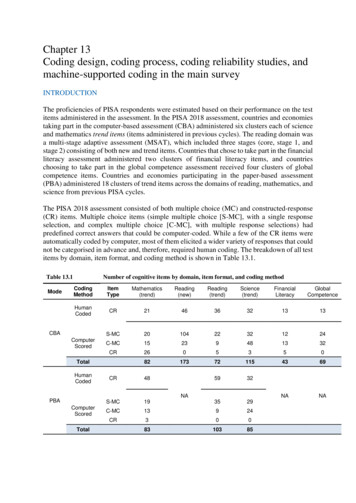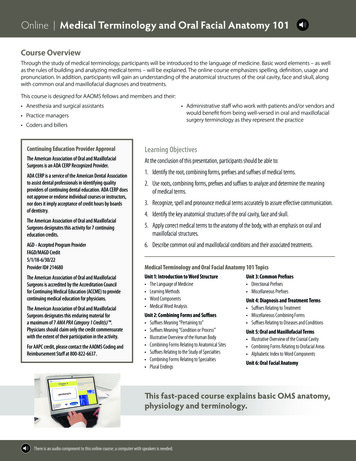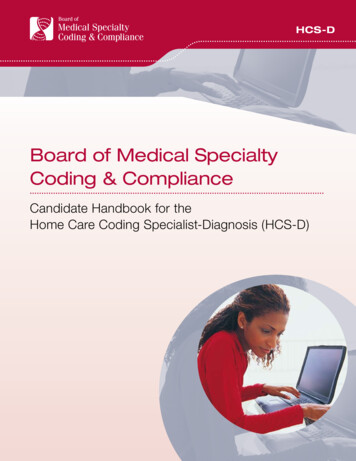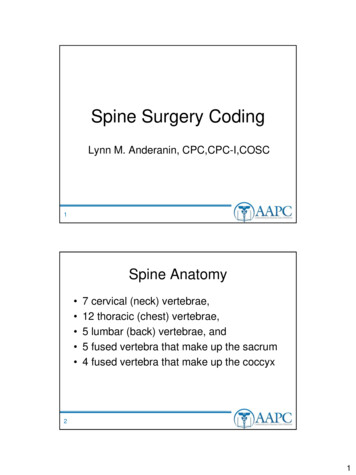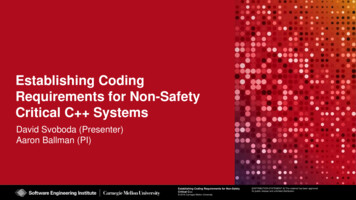
Transcription
SEI Research Review 2016Establishing CodingRequirements for Non-SafetyCritical C SystemsDavid Svoboda (Presenter)Aaron Ballman (PI)EstablishingCodingRequirementsfor Non-SafetyCritical C EstablishingCodingRequirementsfor Non-SafetyOctober2016Critical25,C 20162016 CarnegieCarnegie MellonMellon UniversityUniversity [DISTRIBUTION STATEMENT A] This material has been approvedfor public release and unlimited distribution.1
SEI Research Review 2016Copyright 2016 Carnegie Mellon UniversityThis material is based upon work funded and supported by the Department of Defense under Contract No. FA8721-05-C-0003 with CarnegieMellon University for the operation of the Software Engineering Institute, a federally funded research and development center.Any opinions, findings and conclusions or recommendations expressed in this material are those of the author(s) and do not necessarilyreflect the views of the United States Department of Defense.References herein to any specific commercial product, process, or service by trade name, trade mark, manufacturer, or otherwise, does notnecessarily constitute or imply its endorsement, recommendation, or favoring by Carnegie Mellon University or its Software EngineeringInstitute.NO WARRANTY. THIS CARNEGIE MELLON UNIVERSITY AND SOFTWARE ENGINEERING INSTITUTE MATERIAL IS FURNISHED ONAN “AS-IS” BASIS. CARNEGIE MELLON UNIVERSITY MAKES NO WARRANTIES OF ANY KIND, EITHER EXPRESSED OR IMPLIED, ASTO ANY MATTER INCLUDING, BUT NOT LIMITED TO, WARRANTY OF FITNESS FOR PURPOSE OR MERCHANTABILITY,EXCLUSIVITY, OR RESULTS OBTAINED FROM USE OF THE MATERIAL. CARNEGIE MELLON UNIVERSITY DOES NOT MAKE ANYWARRANTY OF ANY KIND WITH RESPECT TO FREEDOM FROM PATENT, TRADEMARK, OR COPYRIGHT INFRINGEMENT.[Distribution Statement A] This material has been approved for public release and unlimited distribution. Please see Copyright notice for nonUS Government use and distribution.This material may be reproduced in its entirety, without modification, and freely distributed in written or electronic form without requestingformal permission. Permission is required for any other use. Requests for permission should be directed to the Software Engineering Instituteat permission@sei.cmu.edu.CERT is a registered mark of Carnegie Mellon University.DM-0004094Establishing Coding Requirements for Non-Safety Critical C October 25, 2016 2016 Carnegie Mellon University[DISTRIBUTION STATEMENT A] This material has been approvedfor public release and unlimited distribution.2
SEI Research Review 2016Problem Statement and FocusWriting secure C code is hard, existing coding standards are insufficientMISRA C :2008 and JSF (2005) focus on safety-critical systems; outdated CERT rules focus on modern concerns: C 11 and C 14.-Concurrency, lambdas, and other modern, high-impact C featuresC Core Guidelines (2015) are modern, but subset the language; e.g.,- ES.75: Avoid do statementsI.11: Never transfer ownership by a raw pointer (T*)CERT rules do not subset the C language-Encourages adoption within legacy code bases as well as newEnforceability of the rules is desirable. Demonstrate implementing checkers to help strengthen and enforce rulesDo not replicate rules from the CERT C Coding StandardEstablishing Coding Requirements for Non-Safety Critical C October 25, 2016 2016 Carnegie Mellon University[DISTRIBUTION STATEMENT A] This material has been approvedfor public release and unlimited distribution.3
SEI Research Review 2016Our Results: CheckersContributed 15 new checkers to the Clang open sourcecompiler (the C/C frontend to the LLVM compilerinfrastructure)Clang community has shown significant interest inCERT's contributions Community members are making their owncontributions based on our rules Demonstrated a desire to make it easier to enable allchecks for CERT rulesClang is used by 10s of millions of programmers to write100s of millions of apps that are used by billions of users Primary compiler for MacOS, iOS, FreeBSD Supported by Microsoft Visual Studio, LinuxEstablishing Coding Requirements for Non-Safety Critical C October 25, 2016 2016 Carnegie Mellon University[DISTRIBUTION STATEMENT A] This material has been approvedfor public release and unlimited distribution.4
SEI Research Review 2016Our Results: RulesCERT C Coding Standard Rules120100806040200C RulesOldNew (FY16)C RulesInapplicable to C 1. Declarations and Initialization (DCL)2. Expressions (EXP)3. Integers (INT)4. Containers (CTR)5. Characters and Strings (STR)6. Memory Management (MEM)7. Input Output (FIO)8. Exceptions and Error Handling (ERR)9. Object Oriented Programming (OOP)10. Concurrency (CON)11. Miscellaneous (MSC)All rules were heavily modifiedEstablishing Coding Requirements for Non-Safety Critical C October 25, 2016 2016 Carnegie Mellon University[DISTRIBUTION STATEMENT A] This material has been approvedfor public release and unlimited distribution.5
SEI Research Review 2016Our Results: Rule OrganizationTitleIntroduction &Normative TextEstablishing Coding Requirements for Non-Safety Critical C October 25, 2016 2016 Carnegie Mellon University[DISTRIBUTION STATEMENT A] This material has been approvedfor public release and unlimited distribution.6
SEI Research Review 2016Noncompliant CodeDon’t try this at home!Compliant CodeFixes noncompliant code.Establishing Coding Requirements for Non-Safety Critical C October 25, 2016 2016 Carnegie Mellon University[DISTRIBUTION STATEMENT A] This material has been approvedfor public release and unlimited distribution.7
SEI Research Review 2016Establishing Coding Requirements for Non-Safety Critical C October 25, 2016 2016 Carnegie Mellon University[DISTRIBUTION STATEMENT A] This material has been approvedfor public release and unlimited distribution.8
SEI Research Review 2016Establishing Coding Requirements for Non-Safety Critical C October 25, 2016 2016 Carnegie Mellon University[DISTRIBUTION STATEMENT A] This material has been approvedfor public release and unlimited distribution.9
SEI Research Review 2016Our Process ISO WG21 (C Standards Committee)ISO C 14 StandardC BooksMITRE CVEsCERT Vulnerability DatabaseEstablishing Coding Requirements for Non-Safety Critical C October 25, 2016 2016 Carnegie Mellon University[DISTRIBUTION STATEMENT A] This material has been approvedfor public release and unlimited distribution.10
SEI Research Review 2016THE ENDEstablishing Coding Requirements for Non-safetyNon-Safety criticalCriticalC C October 2016 Carnegie25, 2016 Mellon University 2016 Carnegie Mellon University[DISTRIBUTION STATEMENT A] This material has been approvedfor public release and unlimited distribution.11
Writing secure C code is hard, existing coding standards are insufficient MISRA C :2008 and JSF (2005) focus on safety-critical systems; outdated . Do not replicate rules from the CERT C Coding Standard. 4 Establishing Coding Requirements for Non-Safety Critical C October 25, 2016

